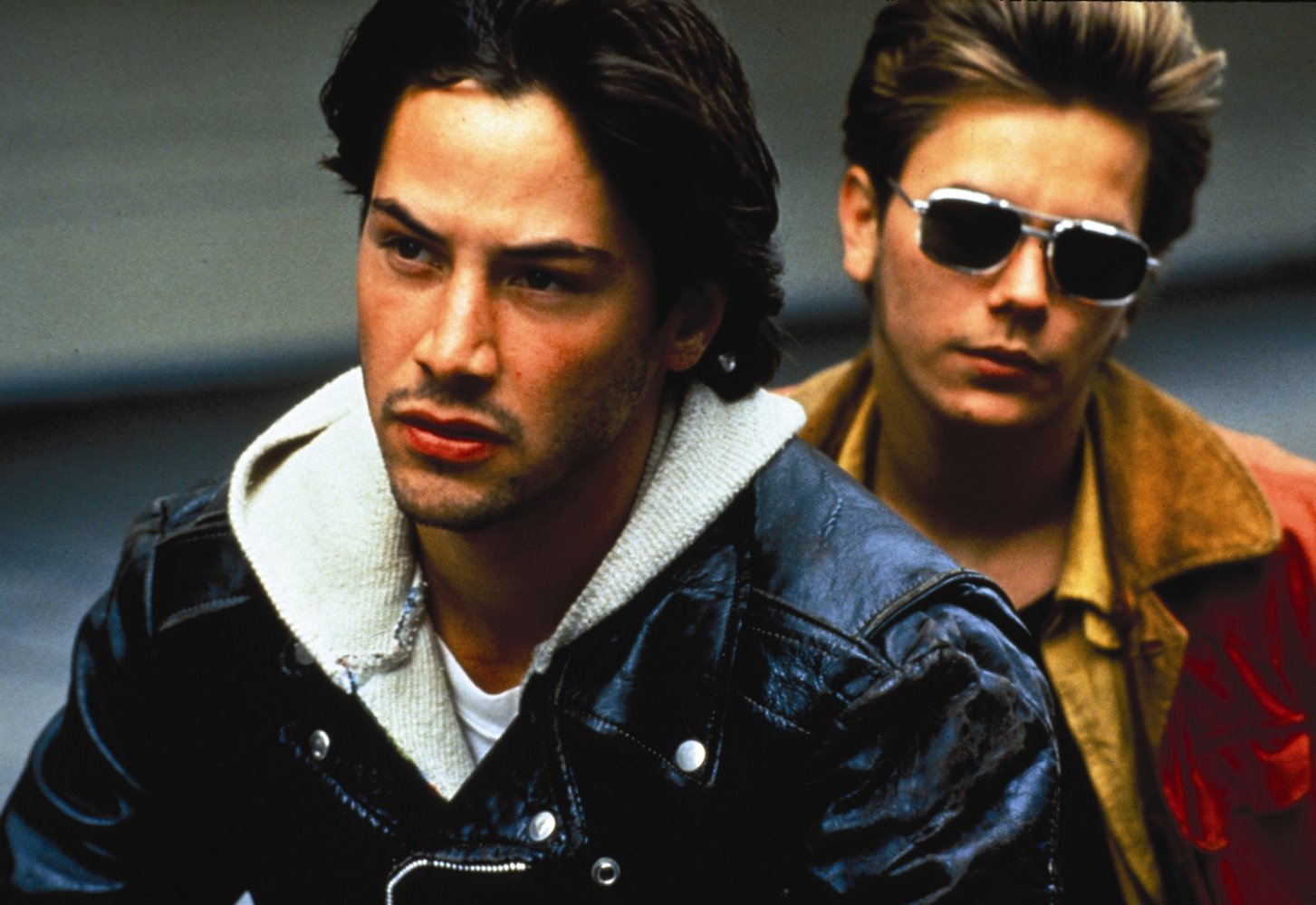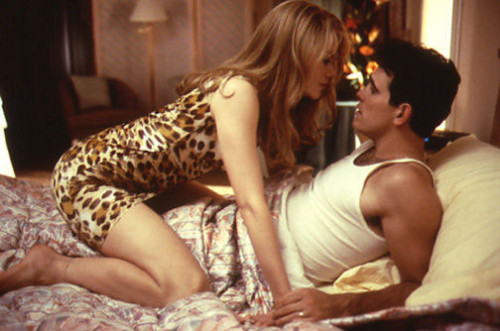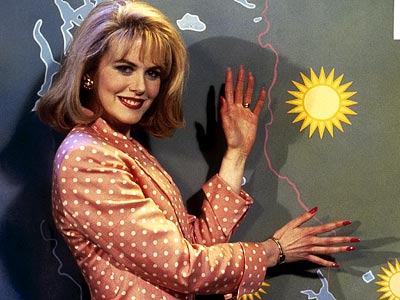This guest post written by Jamie Righetti appears as part of our theme week on Bisexual Representation.
In many ways, Gus Van Sant’s My Own Private Idaho (1991) is a film about duality, weaving together conflicting stories about love, family and the inescapable lure of home, even when it is a place you can never go back to again. And that duality also lends itself heavily to the sexual identities of the film’s main characters, Mike (River Phoenix) and Scott (Keanu Reeves), two street hustlers with opposite views of their own bisexuality, as well as the fulfillment they receive from their life on the street and where it will ultimately take them.
The film’s primary story follows Mike, a scrappy street hustler prone to frequent fits of narcolepsy during which he recalls memories of his mother and his childhood home. Mike bounces around between Seattle and Portland, living rough on the streets and hanging out with other street kids in the same restaurant to keep out of the cold. Mike hustles out of necessity, making just enough to eat and sometimes weaseling extra money out of clients to get by. On the flip side, there is Scott, the handsome son of Portland’s mayor and the heir apparent. As the rich kid slumming it for fun and (according to him) playing gay for pay, Scott serve as a direct foil to Mike as both a character and a subplot in the film.
It is worth nothing that despite the fluidity present in both characters’ sexuality, the film still tends to use very binary language and coding with its depiction of sex work. Mike and Scott are referred to as “street hustlers” rather than prostitutes, which serves to reinforce Scott’s claim that he “only has sex with men for money.” Having sex for pay helps root their identity within the boundaries of masculinity and serves as a direct contrast to selling one’s body for sex, something presumably only women can do. This is further highlighted in our first glimpse of Mike with a client, during which he is being serviced by a client, rather than the opposite. Furthermore, there is often an erasure of Mike’s bisexuality based on his attraction to Scott. Although Mike is seen with more male clients than female ones, he does go home with an older female client and, prior to his narcoleptic episode, seems both willing and interested in sleeping with her. The duality present in both Mike and Scott’s sexuality is not only central to a film about identity but also in understanding the complexities of both characters, who are not as simple as the gay and straight labels often stuck on them.
The duality of My Own Private Idaho also plays out in strange ways at times. Midway through the film, as the story begins to center on Scott, the dialogue and characters take on a Shakespearean tinge. Van Sant has spoken about the influence of Henry IV and Henry V on the film, which is further explored with the introduction of Bob (William Richert), a Falstaff parallel and father-figure to Mike, Scott, and the ragtag crew of street kids they spend time with. While these scenes might feel slightly out of place, especially alongside the gravity of Mike’s story and the search for his mother, they give important insight into Scott. In a conversation with Bob, Scott reveals that he’s just shy of his twenty-first birthday, which is when he will inherit his father’s money. When this happens, Scott will leave the streets and go back to his old life. Within this context, the antiquated Shakespearean dialogue, which feels forced and hollow, serves as a metaphor for Scott, who is well-liked but truly out of place in a world of misfits who don’t have a comfortable identity to fall back on when they get bored.
But while Scott has willingly turned his back on his family, Mike is desperate to reconnect with his. He brings Scott along to Idaho to see his estranged brother to seek out information about where his mother is staying. Mike finds an odd comfort in his narcoleptic flashbacks and his quest in some way is a search for his first love, the one that nostalgia has deemed pure and simple. By reinforcing the purity of true love, it will allow him to validate not just his feelings for Scott but also his bisexuality as a whole, which is often at odds with his lifestyle, where love is commoditized and quantified, and where his sexual preferences must be fluid for profit but never real.
There is perhaps no greater example of this than in the film’s famous campfire confession, a scene which Phoenix himself rewrote. During their road trip from Portland to Idaho, Mike and Scott are forced to camp out in the desert overnight. As they huddle around a meager fire, Mike struggles to open up to Scott and confess his deep feelings. There is a stabbing ache of recognition that comes when Mike timidly asks Scott what he means to him, as both men are suddenly very aware of the weight behind those whispered words. Scott in turn, declares that Mike is his best friend but nothing more.
Recalling an earlier scene in which Mike and Scott are cover boys on gay magazines, Scott tells Mike that he only has sex for money, despite him not being in need of the cash. Before Mike can object, Scott adds as a hasty afterthought: “And two guys can’t love each other.” For Scott, his sexuality is rooted in flawed logic that as long as he’s providing a service and not ascribing any true emotion to sex, he can have his fun and still identify as straight. But his actions seem to contradict this, as he has chosen to hustle not out of necessity but because he enjoys it. For Scott, his chosen lifestyle allows him the freedom to fully explore and express his bisexuality in a way in which his upbringing could never allow. But the roots of his childhood are too deep for him to fully shake and instead, he must mask his sexuality as a commodity, in order to allow him to eventually return to his former life.
Perhaps seeing through this, Mike counters by trying to poke logic into this theory. “Well, I don’t know,” he says. “I could love someone even if I, you know, wasn’t paid for it. I love you, and you don’t pay me.” There is a purity in Mike that is quite absent in Scott, as he is more than certain that his feelings for Scott are real. But despite this, he is still seeking validation – not only love that is returned but that it can be acceptable as love. Scott, however, is unable to return this affection because it will break his own construction of his sexuality, which can only be cast in black and white.
It’s a brilliant and raw scene in which Phoenix oozes vulnerability and insecurity, even physically turning in on himself to shield himself from Scott’s rejection. In the end, Scott feels bad for his friend and calls him over to go to sleep. The two embrace, with Mike folding into Scott’s arms, dutifully accepting the scraps of affection he’s allowed, while swallowing down his unrequited attraction. The two continue their journey as if nothing has happened, but as an audience we’re now attuned to an extra layer of melancholy that surrounds Mike and his interactions with Scott.
In Italy, Scott and Mike’s stories diverge once again, as Scott falls in love with Carmella (Chiara Caselli), an Italian woman living at the farmhouse where Mike’s mother was last seen. It is Carmella who tells the two that Mike’s mother returned home, making his trip (and the things he did to finance it) pointless. Mike sticks around, waiting for Scott so they can return home but Scott is distracted by Carmella. A brokenhearted Mike is subjected to several nights of overheard pleasure between thin bedroom walls before Scott finally hands him a ticket home and abandons him in Italy. But as with many of Scott’s actions, it feels slightly disingenuous. While he certainly is attracted to Carmella, it also feels convenient that he can use her as a means of escape, thereby blocking any reciprocal feelings for Mike that he might be repressing.
Likewise, the telegram Scott receives regarding his father’s death serves as a final nail in the coffin for his old life. Upon his return to Portland, Scott has stepped into his old shoes, riding around in limousines, wearing expensive suits and shunning anyone from his former life, including his one-time mentor and father figure, Bob. In a beautiful juxtaposition, Scott is attending his father’s funeral service, a demure and somber affair, at the same time that Mike and his former friends are celebrating the life of Bob, who died of a broken heart after Scott’s rejection. Scott eyes his former friends with an almost unreadable look on his face; neither envious nor angry, but perhaps (picking up where Mike left off) simply seeking comfort in nostalgia, while simultaneously knowing it is a place where he can never return.
The film then ends on an appropriately ambiguous note. Mike is once again in Idaho on “his” road, the one that reminds him of a “fucked up face.” He collapses after another narcoleptic fit and is robbed of his things by a passing pick-up truck. Finally, a car pulls up and an unseen person picks up Mike and drives away with him. It is unclear if he has been rescued or if he is in danger but it is clear that either way, he (and Scott) won’t find a happy ending. While Mike has the freedom to revel in the lifestyle and bisexuality that Scott can no longer can afford, he also is lacking the comfort of reciprocal love that Scott now has in Carmella. Likewise, neither can ever go back home, quite literally for Mike and metaphorically for Scott, again. It is a bittersweet conclusion that renders Mike’s fate irrelevant and makes us in turn seek to return “home” to the earlier scenes where both men were free to love without fear.
Jamie Righetti is an author and freelance film critic from New York City. Her work has been featured on Film School Rejects and Daily Grindhouse, as well as in Belladonna magazine. Jamie is the host of the horror podcast, ScreamBros, and she has just released her debut novel, Beechwood Park, which is currently available on Amazon. You can follow her on Twitter @JamieRighetti.











